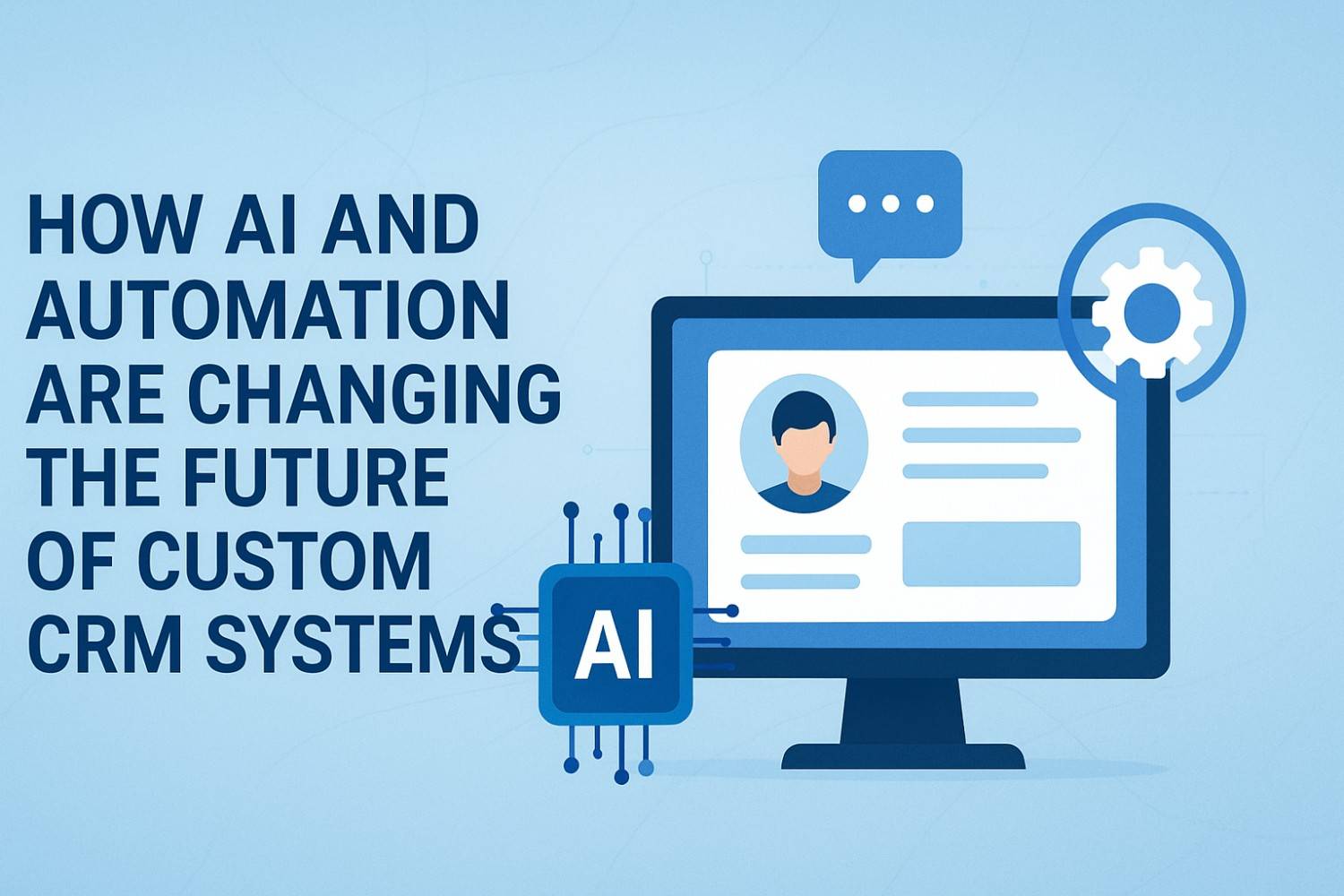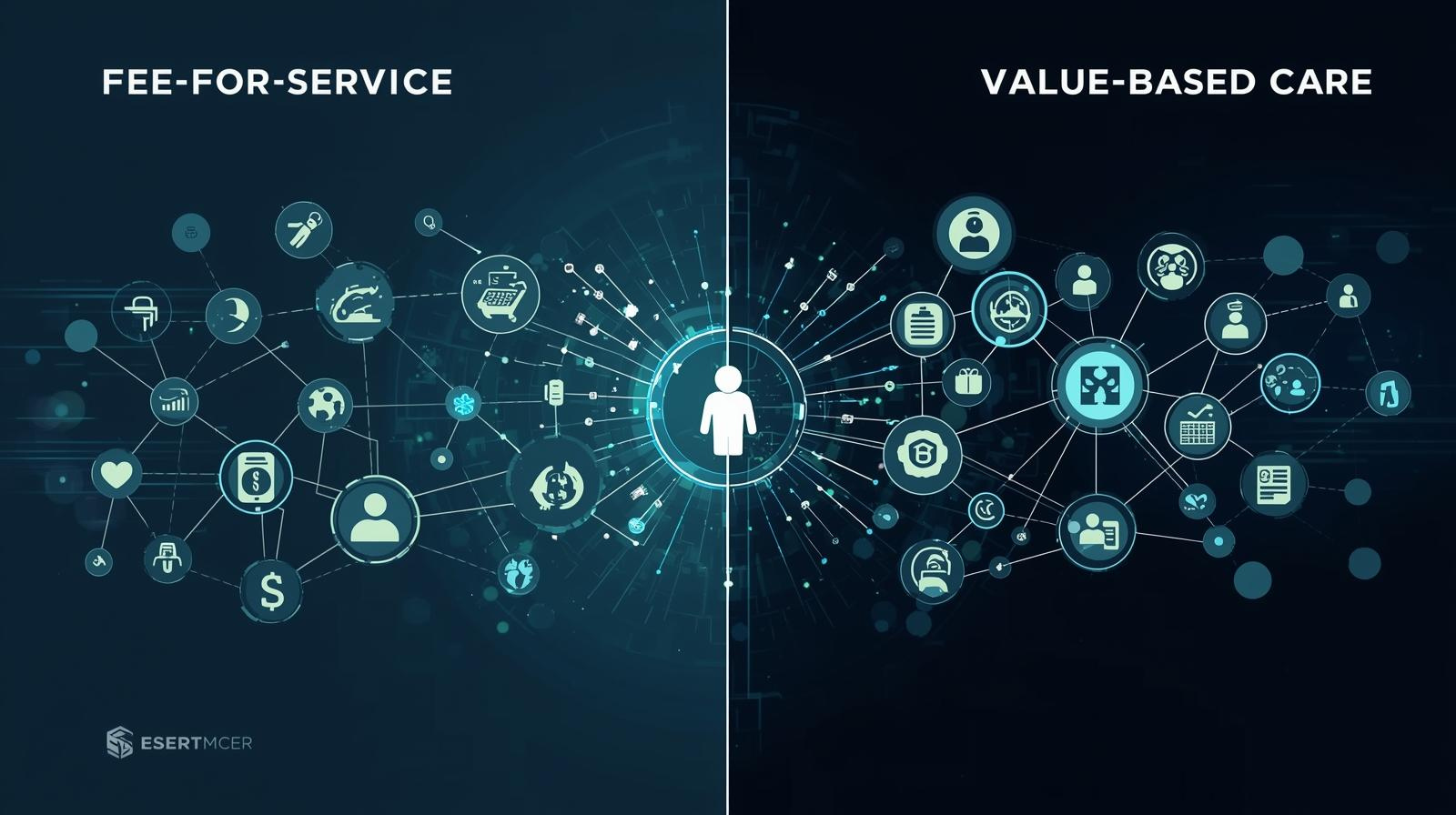How AI and Automation Are Changing the Future of Custom CRM Systems
Introduction
There was a time—not too long ago—when building CRM systems meant manually stitching together fields, forms, and workflows that behaved more like stubborn mules than digital tools. Back then, our team at Kanhasoft often joked that CRMs needed caffeine as much as we did. But today, things look different. AI and automation have reshaped what a CRM can do, turning it from a simple record-keeping tool into a smart partner that anticipates needs before teams even hit “refresh.” And as a dedicated CRM Software Development Company, we’ve seen firsthand how businesses now expect CRMs to think, act, and react more like humans. This new era brings efficiency, clarity, and a surprising amount of personality into customer management—finally.
The Shift Toward Intelligent CRMs
Modern businesses no longer want CRMs that merely store customer data; they want systems that read between the lines and predict what customers might want next. This shift toward intelligence feels a bit like upgrading from a bicycle to a self-driving car—minus the fear of unexpected detours. Intelligent CRMs use algorithms that analyze patterns instantly, allowing teams to make informed decisions rather than educated guesses. As we often tell our clients, an intelligent CRM doesn’t replace your team; it simply removes the clutter that slows everyone down. With AI integration becoming standard, companies now lean on CRM systems that truly assist—guiding, scoring, organizing, and auto-suggesting workflows with remarkable precision.
AI as the New Backbone of CRM Systems
Artificial Intelligence has quietly become the backbone of modern CRM platforms, powering features that customers now consider baseline expectations. Whether it’s machine-learning-driven recommendations or natural-language chat capabilities, AI takes over tasks that once required significant manual effort. We’ve watched businesses go from chasing leads endlessly to having algorithms prioritize them automatically. Even better, decision-making within CRM systems is more data-backed than ever, reducing human error while enhancing strategic clarity. From predicting customer interests to summarizing interactions, AI does more of the “heavy lifting,” letting teams focus on conversations, not data cleaning. And yes—AI still works even when we’re all out of coffee.
Automation: The Silent Workhorse Behind the Screens
Automation doesn’t brag, complain, or take coffee breaks, yet it somehow manages to handle half the workload. Behind every smooth CRM workflow sits a layer of automation quietly pushing tasks forward—sending reminders, logging interactions, updating records, and triggering customer journeys with almost eerie precision. At Kanhasoft, we often say automation is the team member who never misses a deadline. Businesses lean on automated triggers to ensure leads move through the funnel without bottlenecks or human slip-ups. From onboarding sequences to follow-ups, automation keeps momentum flowing. It’s predictable, reliable, and surprisingly adaptable, making it a cornerstone of modern CRM architecture for any business working with a CRM Software Development Company.
How Custom CRM Systems Are Becoming More “Human”
It sounds ironic, but the more technology we add, the more “human” custom CRMs feel. AI now understands context, tone, and even emotional cues—meaning interactions no longer feel robotic or forced. When a customer sounds frustrated, the system can flag it. When a lead shows excitement, the CRM nudges sales teams to respond faster. We’ve seen clients amazed at how natural their automated communication suddenly feels. While these tools don’t quite give hugs, they do offer empathy-driven responses that strengthen relationships. As businesses demand deeper personalization, custom systems built with these capabilities step in with thoughtful automation that mirrors genuine human attentiveness.
Data, Glorious Data—But Smarter This Time
Over the years, we’ve watched companies drown in data they didn’t know what to do with. Now, AI transforms that data into clear, actionable insights. Smart segmentation helps businesses understand who their customers really are, while predictive analytics forecasts what they’re likely to do next. Intelligent dashboards display only what teams need to see—no hunting through spreadsheets, no deciphering complex charts. Working as a CRM Software Development Company, we help clients organize data so it works for them rather than overwhelms them. What was once noise becomes clarity, and what was once clutter becomes strategy—making data more valuable than ever before.
Streamlined Sales Pipelines: No More Spreadsheet Chaos
Sales teams used to rely on a colorful maze of spreadsheets that looked more like an abstract art project than a structured pipeline. Thankfully, AI-driven CRMs have put an end to that chaos. Automated lead scoring identifies high-value prospects instantly, helping sales reps prioritize the right conversations. Predictive conversion models give realistic expectations, saving teams from guesswork. Real-time alerts ensure no opportunity slips through the cracks. And yes—we’ve seen clients practically celebrate after ditching spreadsheets for good. With streamlined pipelines, businesses respond faster, close deals smarter, and operate with confidence supported by AI—not cluttered documents.
Customer Support That Practically Runs Itself
AI-powered customer support tools have matured far beyond scripted chatbot replies. Today’s smart CRMs detect sentiment, route tickets based on urgency, and even provide solutions before agents jump in. Automated triaging reduces customer wait times dramatically, offering an experience that feels fast, smooth, and surprisingly personal. Customers don’t realize automation is working behind the scenes—they just know the service feels better. Virtual assistants handle FAQs, appointment scheduling, and reporting issues with minimal friction. Meanwhile, human agents get to focus on complex problems without drowning in repetitive tasks. It’s efficiency without sacrificing quality, and businesses are loving the results.
Why Automation Reduces Operational Costs
There’s a reason businesses love automation: it cuts costs without cutting quality. Repetitive tasks—data entry, follow-ups, reminders—consume time and lead to inevitable human errors. Automation eliminates those inefficiencies, letting teams focus on strategic, revenue-generating work instead. Operational costs decrease as fewer hours are spent on manual processes, and productivity increases across departments. Even better, automated workflows run consistently, ensuring nothing slips through the cracks. At Kanhasoft, we’ve watched companies scale faster and smoother simply by allowing automation to carry some of the weight. It’s one of the easiest wins in CRM optimization, and one of the smartest investments long term.
Custom vs. Off-the-Shelf CRM: Why AI Makes Custom Better
Off-the-shelf CRMs are fine—until businesses want something that aligns perfectly with their workflows. AI dramatically widens the gap between packaged tools and custom-built systems. Custom CRMs adapt machine learning models to company-specific patterns, creating more accurate predictions and personalized automations. They integrate naturally with internal tools, eliminating the awkward “workarounds” many teams settle for. As a professional CRM Software, we’ve seen custom solutions outperform generic platforms in flexibility, speed, and ROI. Businesses get to automate what matters to them—not what’s pre-programmed. And that difference compounds over time, creating systems that grow with the organization.
The Role of an Expert CRM Software Development Company in AI-Driven Transformation
Implementing AI within a CRM system isn’t just about plugging in a few tools—it’s about aligning technology with business goals. A skilled CRM Software Development Company understands how to design intelligent workflows, train machine-learning models, and ensure the system evolves over time. We help businesses map automation logic, prepare data for AI interpretation, and build dashboards that make sense for real users. Beyond development, long-term support is essential to keep the AI learning, adjusting, and performing at its best. When technology and expertise combine, businesses experience a smoother and more predictable transformation process.
Security Considerations in AI/Automated CRM Systems
As AI and automation take center stage, security becomes the quiet but crucial guardian behind every smart CRM. Businesses rely on these systems to store sensitive customer information, so protecting that data is non-negotiable. With AI, threat detection becomes faster and more accurate, flagging unusual patterns before risks escalate. Automated compliance tracking also helps companies meet industry regulations effortlessly. At Kanhasoft, we emphasize implementing encryption, role-based access controls, and secure API integrations—because even the smartest CRM must be safe. A reputable CRM Software Development builds not only advanced features but also strong defenses, ensuring innovation never comes at the expense of security.
Scalability: Why AI Helps CRMs Grow Without Breaking
Growth is exciting—until systems crash under pressure. Luckily, AI-powered CRMs scale gracefully, adjusting resources based on demand and ensuring performance stays consistent even during peak usage. Machine-learning algorithms help identify trends that influence scalability needs, whether it’s increased traffic, expanding customer bases, or larger data volumes. Automation reduces the manual overhead typically required for scaling operations. We’ve worked with businesses that experienced sudden growth, and without AI-backed scalability, their systems would have crumbled. Instead, their CRMs adapted automatically. This makes AI not just a feature but an essential pillar for any organization planning long-term expansion.
Industry-Specific AI-Enhanced CRM Use Cases
Every industry has its quirks, and that’s exactly where AI-enhanced custom CRMs shine. Healthcare providers use AI to track patient lifecycles and flag critical updates. Real estate firms rely on predictive tools to assess lead intent and property interest. Fintech companies love automated risk scoring, while retail brands thrive with hyper-personalized customer recommendations. As a CRM Software Development Company, we’ve customized systems for businesses across sectors, tailoring AI behavior to match their workflows. The result? Higher efficiency, better customer satisfaction, and fewer manual bottlenecks. Custom AI adapts to each industry’s unique rhythm, delivering smarter solutions every step of the way.
Case Study Style Insight: When Automation Saved a Client from “Spreadsheet Madness”
A client once approached us with a CRM setup that was, in their own words, “95% spreadsheets and 5% optimism.” Their team manually tracked leads, follow-ups, and deals—often losing valuable opportunities in the maze of cells. After implementing automated workflows, predictive scoring, and centralized dashboards, their entire operation transformed. Lead visibility increased, response times dropped, and conversions improved dramatically. The team said it felt like moving from a chaotic garage workshop to a fully automated factory. Stories like these remind us how much difference automation makes when applied thoughtfully and powered by a capable development partner.
Integrations: Connecting AI CRMs With Everything Else
An intelligent CRM isn’t an island—it’s a hub. Modern businesses depend on seamless integrations with ERP systems, HR tools, accounting software, communication platforms, and third-party AI services. APIs and automation pipelines ensure that data flows smoothly between applications without duplicate entries or manual corrections. At Kanhasoft, we specialize in creating custom integration layers that sync information in real time. When systems communicate effortlessly, teams work faster and customers enjoy a more unified experience. Integrations are the glue that binds the customer journey across multiple touchpoints, making the CRM the true command center of the organization.
Predictive Analytics: Seeing the Future So You Don’t Have to Guess
Predictive analytics takes the guesswork out of decision-making by analyzing patterns and projecting future outcomes. Whether businesses want to forecast revenue, predict customer churn, or identify high-value opportunities, AI models provide clarity rooted in data rather than intuition. As a CRM Software Development Company, we build systems that visualize these predictions clearly, helping teams take proactive actions. For example, sales reps can focus on leads most likely to convert, while marketing teams tailor campaigns for customers at risk of disengaging. It’s like having a strategic advisor inside the CRM—one that crunches numbers faster than anyone else ever could.
The Future of AI in CRM: What’s Coming Next
AI within CRM systems is still evolving, and what’s coming next is even more exciting. We’re expecting more autonomous CRMs capable of optimizing workflows without human intervention. Emotion-recognition AI will refine personalization further, while real-time behavioral modeling will allow businesses to respond instantly to customer actions. Self-learning systems will enhance predictions, constantly improving accuracy as they ingest new data. As customer expectations rise, CRMs will become even more proactive—anticipating needs before they surface. For companies partnering with the right CRM Software, the future looks fast, intelligent, and incredibly efficient.
How Businesses Should Prepare for AI-Driven CRM Adoption
Preparing for AI-driven CRM adoption requires more than simply installing new features. Businesses need structured data, trained teams, and clear processes. Change management becomes crucial as employees learn to trust automation and rely on AI insights. We guide clients through data restructuring, workflow refinement, and user training to ensure the transition is smooth. When teams understand how AI supports—not replaces—their work, adoption becomes faster and results become stronger. The organizations that prepare thoughtfully experience the biggest efficiencies and the highest ROI, proving that preparation is just as important as innovation.
Choosing the Right CRM Software Development Company for AI Projects
Selecting a CRM Software Development Company for AI-driven systems is a bit like choosing a long-term business partner—you want expertise, reliability, and someone who actually listens. The right partner understands not just coding but business workflow psychology. They assess data strength, recommend suitable AI models, and align technology with company goals. At Kanhasoft, we often remind clients that AI isn’t a plug-and-play feature; it requires thoughtful strategy, model training, and continuous optimization. A strong development team offers transparency, clear communication, and a proven track record. When those elements come together, businesses gain a CRM system that grows intelligently and sustainably.
Common Myths About AI in CRM
Over time, we’ve encountered several myths that make AI sound more like science fiction than practical technology. One popular myth claims “AI replaces people,” which couldn’t be further from the truth—AI supports teams, not substitutes them. Another insists AI is instantly ready “out of the box,” but customization and data training are essential for accuracy. Some even believe AI is too expensive for mid-sized companies, yet custom-built solutions often reduce long-term costs. As a seasoned CRM Software Development , we know AI isn’t magical—it’s methodical. And when built correctly, it simply makes work easier, faster, and smarter.
Conclusion
As businesses push toward smarter, more efficient workflows, AI and automation are shaping a future where CRMs aren’t just tools—they’re intelligent partners. From predictive analytics to automated workflows, the possibilities are expanding faster than ever. At Kanhasoft, we’ve seen firsthand how the right combination of AI, strategy, and thoughtful development can transform operations and elevate customer experiences. Whether a company needs personalized marketing, streamlined sales pipelines, or hands-free data management, AI-driven CRM systems deliver clarity and momentum. And with the support of a trusted CRM Software Development Company, the future isn’t just bright—it’s exceptionally well-organized.
FAQs
How does AI improve custom CRM systems?
AI enhances CRM systems by analyzing patterns, predicting behaviors, and automating processes. It enables personalized interactions, smarter decision-making, and faster workflows—helping businesses operate more efficiently.
Is automation in CRMs expensive to implement?
Not necessarily. While upfront setup requires investment, automation significantly reduces long-term operational costs by eliminating repetitive tasks and minimizing human error.
What industries benefit most from AI-powered CRM systems?
Industries like healthcare, real estate, fintech, retail, and logistics see major improvements through predictive insights, automated communication, and personalized customer journeys.
How secure are AI-driven CRM systems?
With proper encryption, access control, and automated threat detection, AI CRMs are highly secure. Working with an experienced CRM Software Development Company ensures strong protection.













